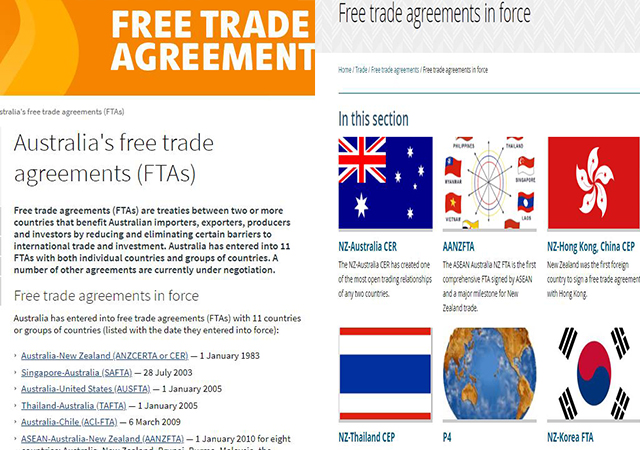 The prospects of free trade agreements between the United Kingdom, Australia and New Zealand have been the focus for several working groups. [Photos: websites of the Australian and New Zealand governments]
The prospects of free trade agreements between the United Kingdom, Australia and New Zealand have been the focus for several working groups. [Photos: websites of the Australian and New Zealand governments]
[This is an extract from an article in the current edition of The Round Table: Commonwealth Journal of International Affairs]
It is useful to look at Australia and New Zealand together in terms of trade relations with the United Kingdom post-Brexit. The two countries have a Closer Economics Relations Treaty dating back to 1983, which provides for free trade between the two countries, which in turn means they are economically fairly highly integrated. The Trans-Tasman Travel Arrangement of 1973 between the two countries also means that there is a free flow of labour between them. In addition, a range of other less well-known coordination agreements exist between them, such as those in the area of electrical standards for products, which help to create a unified market. Companies in the United Kingdom that export to Australia, therefore, generally export to New Zealand as well. British tourists to Australia often visit New Zealand as well. In addition, there is some overlap between the exports of Australia and New Zealand in the case of horticulture, wool, meat and dairy, although Australia differs in that it has a substantial export mining industry which New Zealand does not possess, while New Zealand has an export forestry products industry. It is for these reasons that it is useful to include Australia and New Zealand together in discussing the United Kingdom’s post-Brexit trade relations, and why the House of Commons International Trade Committee, in undertaking an inquiry into trade and the Commonwealth (established in November 2017), is looking at the case of the two countries together.
The United Kingdom will formally leave the European Union by the end of March 2019, after which there will be a transition period until the end of 2019. In this period the United Kingdom government is not permitted by European Union rules to negotiate free trade agreements with countries outside the Union; however, is has established trade working groups with both Australia and New Zealand with the view to beginning formal negotiations on a trade agreement during the transition period. Brexit at the time of writing (October 2018) could still take a variety of forms. A ‘hard’ withdrawal could involve the United Kingdom trading with the European Union under the World Trade Organisation’s Bali Package, but with no obligation to accept free movement of people. Alternatively, a ‘soft’ withdrawal might involve retaining membership of the European Union Customs Union and at least some free movement of people, according to European Economic Area rules. Negotiations between the United Kingdom and the European Union on trade post-Brexit have focused on proposals put forward on 12 July 2018 in a White Paper released by the United Kingdom government, involving the implementation of a common rule book for goods committing Britain to harmonisation and free trade with the European Union. This would also include the United Kingdom government applying its trade policy on goods destined for the United Kingdom, and European Union policy trade policy on goods destined for the European Union. These proposals of October 2018 remain the subject of ongoing negotiations.
If the United Kingdom were to remain within the Customs Union (soft Brexit) then the impact on trade relations with countries outside Europe would not be significant, especially in terms of tariffs, although it is possible that the United Kingdom might over time reduce agricultural subsidies from current levels, which would allow for some increase in agricultural imports from countries such as Australia and New Zealand. If the United Kingdom leaves the European Customs Union, involving say the White Paper proposals, then there may be scope for there to be negotiated tariff-reducing trade deals with countries such as Australia and New Zealand that produce greater access to British markets, and in turn increased access of British goods to Australian and New Zealand markets. Australian and New Zealand goods would still need to meet European standards of quality.
Generally in studies about the future of economic relations between the three countries the main focus has been on the trade in food products. Free trade agreements could have a significant impact on agricultural exports from Australia and New Zealand, for instance approximately a third of New Zealand’s total merchandise goods exports to all markets are dairy products, although dairy is a much smaller percentage of New Zealand’s exports to the United Kingdom. The United Kingdom is a major net importer of dairy products, with over 90% of imports coming from member countries of the European Union. This is largely due to the high tariff barriers that exist preventing New Zealand dairy products entering the European Union (including the United Kingdom). A similar situation exists for the export of dairy produce from Australia and horticultural products from both Australia and New Zealand.
Malcolm Abbott is with the Department of Economics, Swinburne Institute of Technology, Melbourne, Australia.



